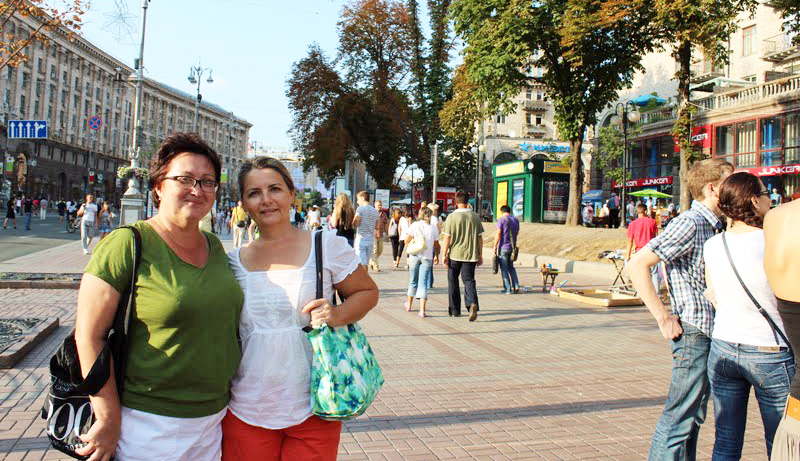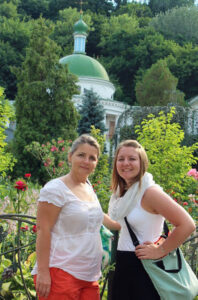Former resident fears for loved ones, countrymen in Ukraine
By Jay Turner
Former longtime Canton resident Tanya Finegold with her close friend Elena on the streets of Kyiv, Ukraine
This story originally appeared in the March 3 edition of the Canton Citizen.
As someone who spent her formative years under Soviet rule, was later stripped of her citizenship and interrogated by the KGB, and then went on to witness the devastating effects of the Chernobyl nuclear disaster and its subsequent government mishandling, Tanya Finegold has long understood the dangers of authoritarianism and unchecked power.
But never before in her lifetime has Finegold felt the combination of fear, shock, outrage, and utter helplessness that she’s experienced in waves since last Thursday night as Russian forces invaded her beloved Ukraine, launching a full-scale military offensive with almost an immediate push toward Kyiv, the capital and most populous city.
“I’m just in disbelief,” Finegold, a former longtime Canton resident, said by phone on Sunday. “I didn’t sleep the whole first night [of the invasion] and I did not sleep the following night. I’ve just been glued to the TV this whole time, and so many people have called to offer their support, some who I haven’t spoken to in 20 years.”
Originally from Donetsk — a coal mining center in the eastern part of the country that is currently controlled by Moscow-backed separatists — Finegold left Ukraine with her husband and daughter in 1991, and at the time she thought she would never be welcomed back. To her great surprise, however, the Soviet Union collapsed just months later, and she was welcomed back with open arms, making several return trips over the years to visit loved ones and friends.
Even as she settled into a new life in Massachusetts, Finegold said she has always felt connected to her roots, and now, watching from afar as her outnumbered and out-gunned countrymen dig in and fight for their lives, she has never felt closer or prouder to be a Ukrainian.
“People from Ukraine are freedom-loving people,” she said. “They want to sing and dance and succeed in everything they put their mind to. Even if [Russian dictator Vladimir] Putin plants his flag in the capital, our people will fight him tooth and nail until they’re free.”
Indeed, early news reports have been filled with accounts of Ukrainians’ uncommon bravery—from the young marine engineer who detonated an explosive on a bridge to thwart a Russian advance, to the countless civilians who have stood up to Russian soldiers and their tanks.
Finegold said she is not surprised in the least, although she acknowledges Russia’s military might and knows that a protracted war would not favor Ukraine. “My realistic hope,” she said, “is that it ends in a week to 10 days. “I hope the people will stand and [Putin] will be destroyed.”
At the same time, Finegold said her heart breaks for families who have lost loved ones or watched their homes be destroyed. (As of Tuesday, several key Ukrainian cities were under attack and estimates of civilian casualties ranged from several hundred to over 1,000.)
Finegold’s 88-year-old father as well as her sister still live in Ukraine, and while there does not appear to be anything of value to the Russians in their small village, she still naturally fears for their safety and well-being.
Meanwhile, she continues to pray for the safety of one of her close friend’s daughters, who is currently in Kyiv, which has seen heavy fighting and has been the target of countless missile strikes.
Just before the invasion, Finegold said the young woman, who lives in an apartment in the city and recently celebrated her college graduation, assured her that there was no reason to worry and it was business as usual in the capital city. “Everyone felt that way,” Finegold explained, noting that even as Russia mobilized its troops near the border, most Ukrainians thought Putin was just “bluffing.”

Tanya Finegold poses for a photo with her daughter Helen, a Luce Elementary School alum, during their 2012 trip to Ukraine.
“My friend’s daughter kept saying, ‘Don’t worry. Don’t worry. We don’t think anything bad will happen. And everything happened so fast that she didn’t have time to evacuate. Now they are stuck there in Kyiv and hiding in their apartment, using a matress to block their windows. But they can still hear everything, and when they see a bright light they count until they hear the explosion — to determine how far away the blast was.”
While Russia’s plans for aggression seem apparent in hindsight — and warned about for months by U.S. intelligence sources — Finegold said that every Ukrainian she knows was still shocked that Putin went through with the invasion.
“Because everybody from there knows that Russian people, Ukrainian people, Belarusian people, all the Slavic nations, were like sisters and brothers,” she explained. “My cousin’s kids live in Moscow, another one is somewhere in Russia. Our kids are all over this area. We did not even ask, ‘Are you Russian? Are you Ukrainian?’ We love you. We marry and we have kids together. We move from one city to another. And then all of a sudden [Putin] just made this total disaster for any given family.”
“So for this kind of madness to happen, it’s something that nobody would expect.”
Knowing the region and the culture there, Finegold said she is certain that for many Russian soldiers, their heart is simply not in this fight. “I bet almost every one of them has cousins or an aunt or a grandmother in Ukraine,” she said. “I bet they were coming here for fun or to visit friends or family. A lot of the Russian soldiers are just kids probably from villages who did not know anything.”
But the one silver lining in this terribly unpopular war, said Finegold, is the incredible outpouring of love and support that Ukrainians have received from all over the world — even in some instances from Russians who have risked their freedom and their future job prospects to protest what they see as an unjust war.
And having served as a volunteer interpreter for the Chernobyl Children’s Project during the years she lived in Canton, Finegold said she is willing to bet that any of those kids who spent their summers in Canton with local host families — kids who have faced medical and other challenges as a result of the 1986 nuclear disaster and are now young adults — are “all against this war.”
“Because they would not believe this propaganda,” she said. “Many of those kids came here not only from Ukraine but from Russia and Belarus, and I’m just sure they’re against Putin and this war. He’s just pure evil.”
Short URL: https://www.thecantoncitizen.com/?p=85186










